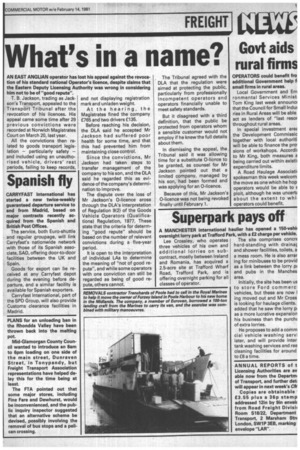What's in a name?
Page 17

If you've noticed an error in this article please click here to report it so we can fix it.
AN EAST ANGLIAN operator has lost his appeal against the revocation of his standard national Operator's licence, despite claims that the Eastern Deputy Licensing Authority was wrong in considering him not to be of "good repute".
T. B. Jackson, trading as Jackson's Transport, appealed to the Transport Tribunal after the revocation of his licences. His appeal came some time after 29 previous convictions were recorded at Norwich Magistrates Court on March 20, last year.
All the convictions then related to goods transport legislation — particularly safety — and included using an unauthorised vehicle, drivers' rest periods, failing to keep records, and not displaying registration mark and unladen weight.
At the hearing, the Magistrates fined the company £765 and two drivers £135.
Before reaching his decision, the DLA said he accepted Mr Jackson had suffered poor health for some time, and that this had prevented him from maintaining close control.
Since the convictions, Mr Jackson had taken steps to transfer management of the company to his son, and the DLA said he regarded this as evidence of the company's determination to improve.
The dispute over the loss of Mr Jackson's 0-licence arose through the DLA's interpretation of Regulation 9(2) of the Goods Vehicle Operators (Qualifications) Regulation, 1977. These state that the criteria for determing "good repute" should be based on the number of relevant convictions during a five-year period.
It is open to the interpretation of individual LAs to determine the meaning of "not of good repute", and while some operators with one conviction can still be regarded as being of good repute, others cannot. The Tribunal agreed with the DLA that the regulation were aimed at protecting the public, particularly from professionally incompetent operators and operators financially unable to meet safety standards.
But it disagreed with a third definition, that the public be protected from operators whom a sensible customer would not employ if he knew the full details about them.
In dismissing the appeal, the Tribunal said it was allowing time for a substitute 0-licnce to be granted, as counsel for Mr Jackson pointed out that a limited company, managed by his son, had been formed and was applying for an 0-licence.
Because of this, Mr Jackson's 0-licence was not being revoked finally until February 1.








































































































